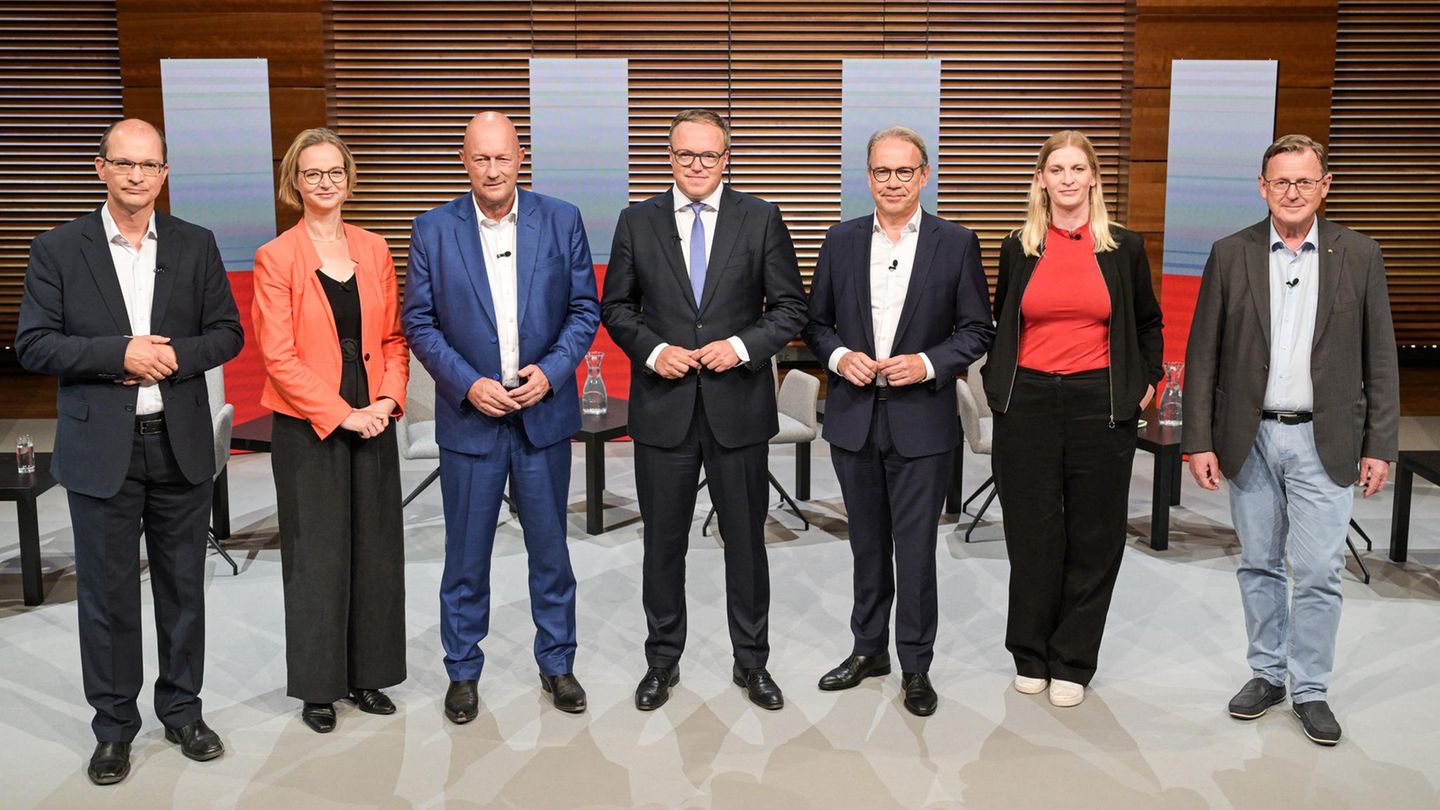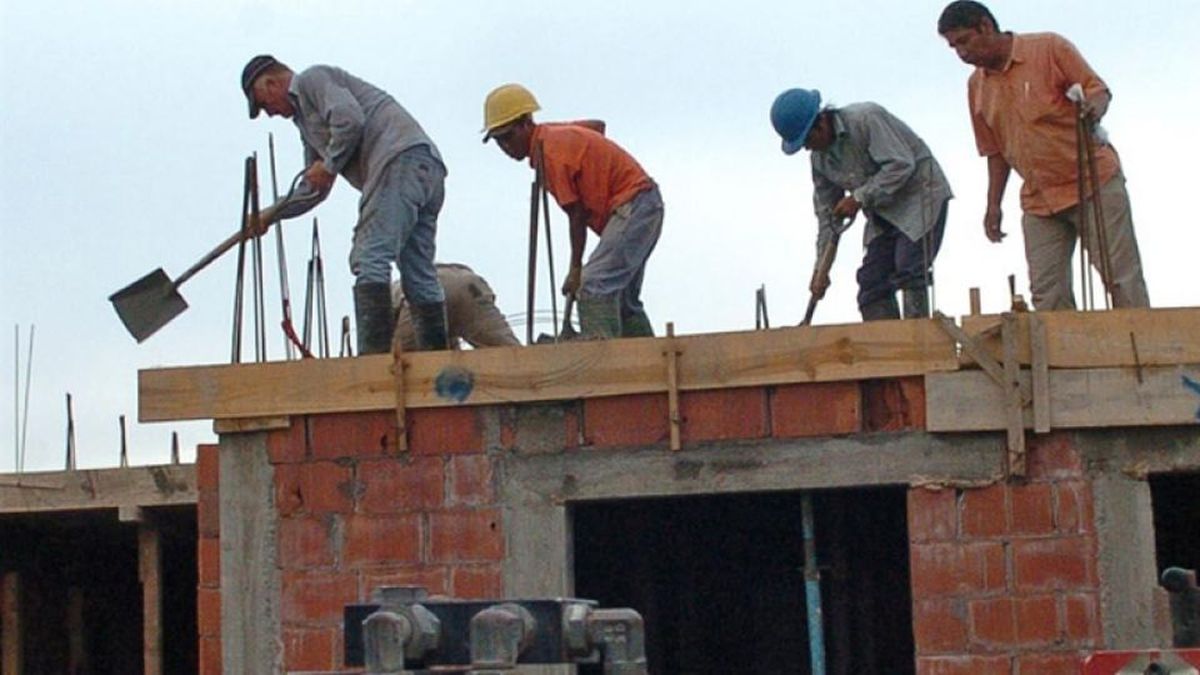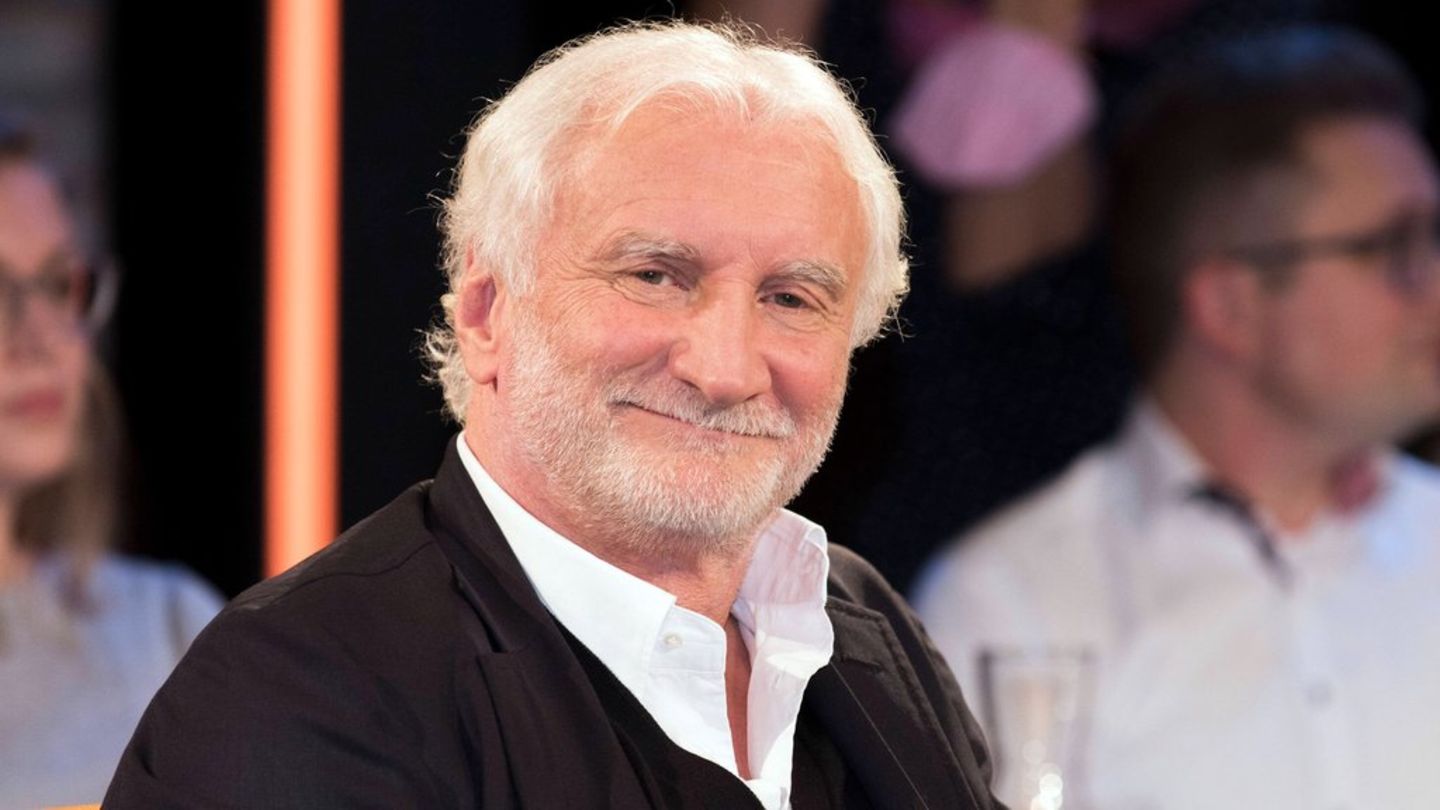Less than 100 hours before the Thuringian state election, the top candidates competed against each other on ntv. As expected, it was a heated debate. However, one person was missing: AfD state leader Björn Höcke.
There he stands in the Weimarhalle, looking a little lost: Stefan Möller, a lawyer from Erfurt, a member of the AfD state parliament – and co-state party leader of Björn Höcke. He is supposed to explain something that is difficult to explain: Why did his top candidate Björn Höcke not come to Weimar on this Wednesday afternoon to argue with the other top candidates?
Möller enters the hall from which the broadcast is about to begin. So, what about Höcke? “I’m not a doctor either,” he tells the star. “All I know is that he couldn’t sleep all night.”
That’s a pretty surprising answer. But Möller even repeats it again when moderator Nikolaus Blome asks him the same question shortly afterwards. And he adds: “Even right-wing populists” can sometimes show “weak health”.
This marks the beginning of the last major TV debate before the state elections on September 1st. The top candidates from all parties that sit in a German parliament are taking part – except Höcke. The invitation from ntv and the private broadcaster Antenne Thüringen had been around for months and Höcke had accepted it. But then, on the day of the debate, he sent word that he had declined, for “health reasons”. Möller came instead.
At least Höcke is obviously expecting a quick recovery. Less than 24 hours later, on Thursday afternoon, he wants to appear again at an AfD rally in Nordhausen. “From tomorrow onwards, the election campaign will continue as planned,” his party spokesman wrote on X shortly after the cancellation.
Does the cancellation indicate nervousness? In fact, Höcke has recently been harshly attacked in the talk shows. And he often didn’t look good. CDU top candidate Mario Voigt in particular is trying to establish himself as his main opponent. The decision will be between the Union and the AfD, he has been saying for months. The Left Party with its Prime Minister Bodo Ramelow is out.
Ramelow: Björn Höcke lies shamelessly into the camera
The most recent case of conflict: Höcke was outraged at an election campaign event about the company campaign “Made in Germany – Made by Diversity” and shouted: “I hope that these companies will experience serious, serious economic turbulence.” Voigt then accused the AfD state leader in a top candidate round on MDR of wanting to harm the Thuringian economy – which Höcke in turn rejected as a “lie”. The companies he attacked, such as Stihl, Vorwerk and Miele, did not even have any locations in the state.
But of course companies that operate in Thuringia are also involved in the campaign, be it the logistics company Fiege or the drugstore chain Rossmann. Höcke had, once again, gone astray rhetorically. Ramelow also joined in on this at X: “Björn Höcke is lying. He lies shamelessly into the camera. And lies and lies and lies! Without character.”
It was predictable that the topic would be raised again in Weimar if Höcke were to attend – and it obviously disturbed the night’s rest. Without the AfD’s top candidate, the group discussed the consequences of the terrorist attack in Solingen, the lack of skilled workers and the cancellation of classes at schools. The questions come from people in Thuringia who were collected by the private broadcaster in recent weeks.
There is a lot at stake in Thuringia
In the meantime, the mood threatens to change. Ramelow shows his notorious temper when he is repeatedly interrupted by FDP state leader Thomas Kemmerich – the man who was briefly a prime minister elected by the AfD and is running again against the will of his federal party. “It is unbelievable and incomprehensible that Mr. Kemmerich forgets what responsibility he has for the chaos here in Thuringia!” shouts the head of government, who has led a minority government for a good four and a half years.
Once again, there is a lot at stake in Thuringia, for the parties involved, but above all for the country. According to the polls, the AfD has been in the lead for months with 30 percent. The Union and the Sahra Wagenknecht Alliance, or BSW for short, are fighting for second place, which is crucial for forming a government. Depending on the opinion research institute, the CDU is at between 21 and 23 percent, while the BSW is at between 17 and 20 percent. The Left under Prime Minister Bodo Ramelow, on the other hand, is only at between 13 and 16 percent.
The air gets thin behind them. The SPD is only just above the 5 percent hurdle with 6 to 7 percent. The Greens have already slipped below that with 3 to 4 percent, as has the FDP, which is doing even worse.
This raises two main questions. Firstly: will the AfD and the Left win the most seats in parliament, as they did in 2019? If so, provided the so-called “firewall” and the CDU’s demarcation decision are observed, a majority government would again not be possible. The country would then automatically slide into a government crisis.
Secondly, will the AfD manage to fill more than a third of the seats in the state parliament? Then a party that is partly right-wing extremist would have the so-called blocking minority. This means that it could, among other things, block constitutional changes or judicial elections – or would have to be integrated.
According to the current survey results, both scenarios could just about be avoided. If it were to happen as Forsa recently reported on behalf of RTL and star the CDU could govern with the BSW and the SPD. The AfD, on the other hand, would narrowly miss the blocking minority.
In the end, it may only be a matter of a few thousand votes. Accordingly, the debate often focuses on the man who is representing Höcke. “If the AfD comes to power, many people will leave Thuringia,” says the Green Party’s top candidate Madeleine Henfling. BSW top candidate Katja Wolf also accuses the AfD of “perverse exaggeration” and “hate speech” that should not take hold in Thuringia, otherwise there would be an even greater shortage of staff in the health sector, for example. CDU man Voigt adds that one in four hospital doctors has a migration background.
Möller tries to counter this. “No reasonable person is afraid of the AfD,” he says. Finally, Voigt gets around to criticizing Höcke’s statement about companies. That is “poison for the country,” he says.
But why, asks moderator Blome, does the CDU also rule out a coalition with the Left Party – but not with the BSW? Voigt meanders and evades the question. “We cannot continue like this,” he says.
BSW top candidate Wolf said she was ready for talks, but added that the AfD was “not capable of governing” in Thuringia in particular, because it was “deeply fascist”. The other candidates also rejected cooperation with the AfD, but did not reveal any preferences for specific coalition models. They do not yet know where the journey might lead – but they do know that it could be complicated.
Source: Stern
I have been working in the news industry for over 6 years, first as a reporter and now as an editor. I have covered politics extensively, and my work has appeared in major newspapers and online news outlets around the world. In addition to my writing, I also contribute regularly to 24 Hours World.




